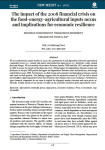Rokopanos A., Bersimis F., Trivellas P. (2025). The impact of the 2008 financial crisis on the food-energy-agricultural inputs nexus and implications for economic resilience. New Medit, 01/03/2025, vol. 24, n. 1, p. 69-82.
https://doi.org/10.30682/nm2501d
https://doi.org/10.30682/nm2501d
| Titre : | The impact of the 2008 financial crisis on the food-energy-agricultural inputs nexus and implications for economic resilience (2025) |
| Auteurs : | A. Rokopanos ; F. Bersimis ; P. Trivellas |
| Type de document : | Article |
| Dans : | New Medit (vol. 24, n. 1, March 2025) |
| Article en page(s) : | p. 69-82 |
| Langues : | Anglais |
| Langues du résumé : | Anglais |
| Catégories : |
Catégories principales 06 - AGRICULTURE. FORÊTS. PÊCHES ; 6.1 - Généralités. Situation AgricoleThésaurus IAMM ALIMENTATION HUMAINE ; ENERGIE ; MOYEN DE PRODUCTION AGRICOLE ; CRISE ECONOMIQUE ; IMPACT ECONOMIQUE ; REGION MEDITERRANEENNE |
| Résumé : |
We use multivariate copula models to assess the asymmetries in tail dependence between agricultural commodity prices (i.e., cereals and meats) and production input prices (i.e., fertilizers, seeds, animal feed and energy). We use monthly observations between January 2000 and May 2022 and split the time in 2009 to assess the results of the financial crisis. We find upper tail dependence between cereals and fertilizers in the pre-2009 period and upper tail dependence between seeds and fertilizers, and energy and fertilizers post-2009.
Furthermore, we find strong and symmetric tail dependence between cereals and seeds in both periods. Our findings suggest that the protective nature of CAP has led to moral hazard effects depriving farmers from the incentives that enhance the sector resilience. Furthermore, agro-chemical companies do not seem to exploit the oligopoly market structure and raise prices arbitrarily. Finally, based on our results, we infer on the economic resilience of the agricultural sector |
| Cote : | En ligne |
| URL / DOI : | https://doi.org/10.30682/nm2501d |







